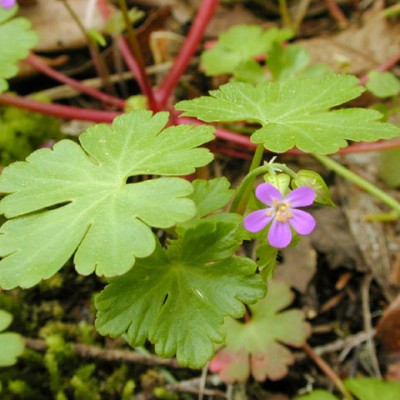Shiny Geranium
Geranium lucidum
Plant Description
Low-growing delicate-looking annual with shiny rounded lobed leaves borne on delicate red stems. Tiny 5-petaled pink flowers bloom in spring and autumn. There may be several flushes of shiny geranium germinating in a single year. It is incredibly aggressive in part-shade, along roadsides, and in disturbed areas.
Plant Details
| Life Forms | |
|---|---|
| Habitats | |
| ODA Listing | |
| Soil and Moisture Conditions | |
| Suggested Actions | |
| Shade Preference | |
| Mature Height | 18" |
| Distribution | Western Oregon, Washington, and California and expanding. Common throughout the Willamette Valley. |
| Control | Prevent spreading shiny geranium by cleaning shoes and avoiding walking through infestations. It doesn't have much of a root system, so it's easy to pull by hand. Hand-pull small infestations before they set seed. Mulch with a thick layer of wood chips to prevent germination of seeds. Flame weeding is also effective. It may have several flushes in a single year so it should be controlled every few weeks in spring-to-early-summer and autumn-to-winter to prevent seed set. Mowing is not effective and can spread seeds. |
| Disposal Methods | If shiny geranium hasn't produced flowers yet, you can pull it and place it in a dark compost pile or under a tarp to allow it to dry out. If it has produced flowers, geranium should be bagged and disposed of in the municipal waste to prevent spreading seeds. |
| Reproduction and Spread | Shiny geranium produces large quantities of tiny seeds which can cling to shoes and be spread to new areas. The only effective way to control it is to prevent seed set. |
| Introduced | Eurasia and north Africa |
| Look Alikes | Doves-foot geranium Herb Robert Redstem filaree Rose checkermallow |
| Impact | Incredibly aggressive in woodlands and disturbed areas, it can form dense monocultures that prevent the establishment of other plants. It has little food value for native plants and insects. |
| More Info |
© Marion Soil and Water Conservation District. All Rights Reserved.

